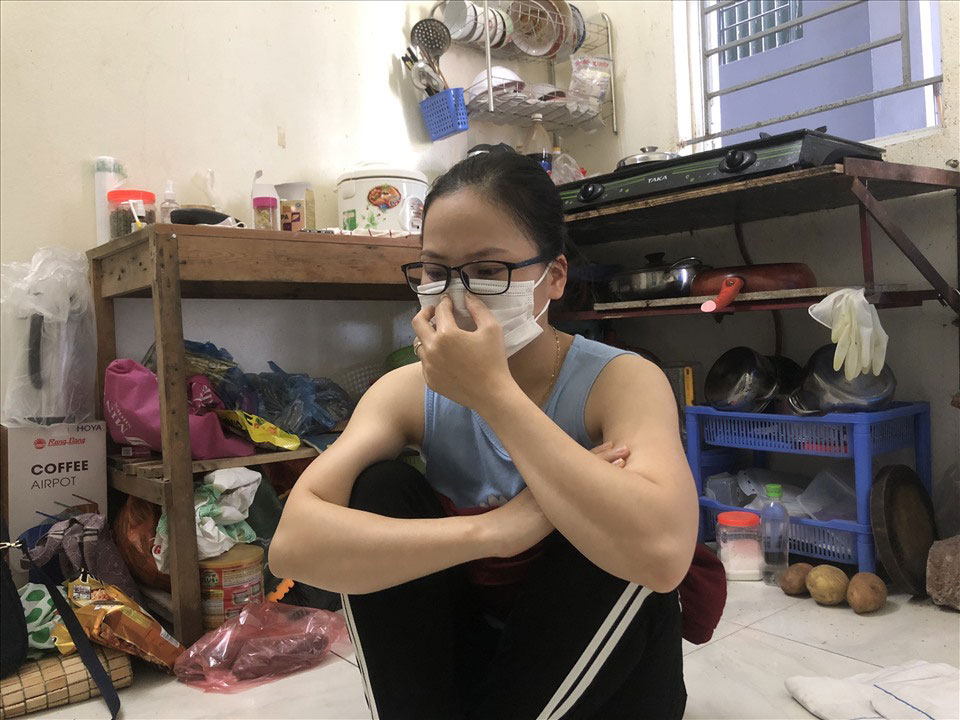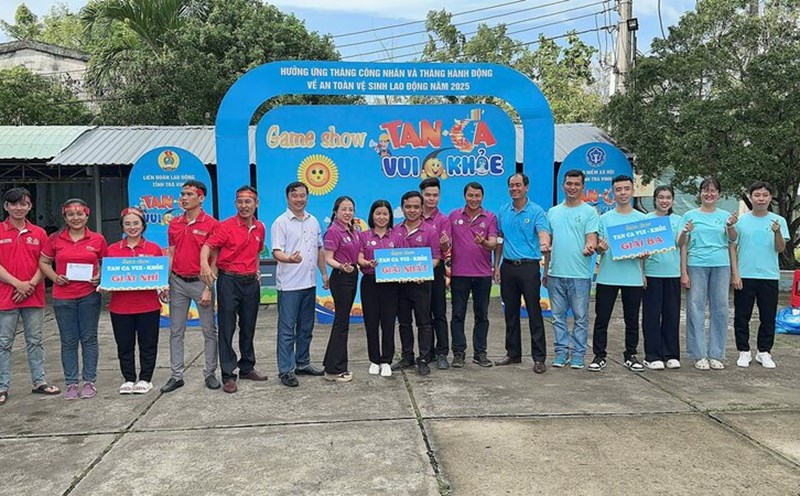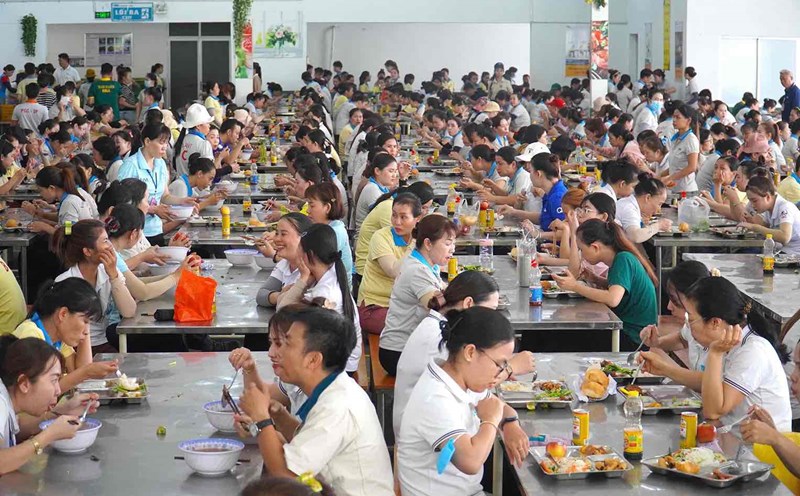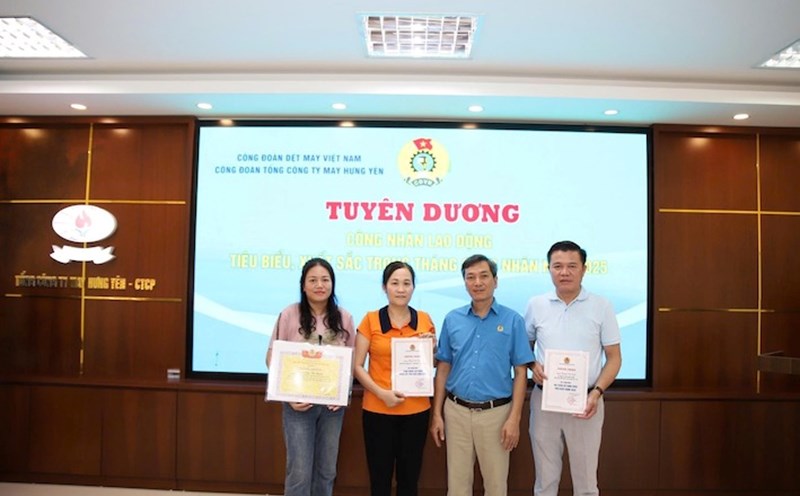COVID-19 concerns are always present, but above all, we carry a mission: How to make policies and ensure that the most necessary information reaches workers at the most difficult times.
Days of hunting for news in the epidemic area
At that time, many people jokingly called us "workers' hunters", because in the midst of the epidemic, it was not easy to find them. I still clearly remember the meeting with Ms. Nguyen Thi Tham - a worker at Hoya Glass Disk Company (Thang Long Industrial Park, Hanoi).
She is from Bac Giang, married in Ba Vi. At that time, both her hometown and her hometown were the center of the epidemic. Both husband and wife work 12 hours of overtime per day, with a combined income of about 15-17 million VND/month, but the biggest concern is not money, but health and information.
The company has not announced anything about vaccination. If we had to pay, we workers would still try, but we didn't know who to ask, where to find it" - Ms. Tham wondered. That statement made us feel overwhelmed.

Workers like you make sweaters, when coming to the rented room, they only have time to cook through the loudspeaker and go to bed, how much time to search for policy information? But information about vaccines, social insurance, and support packages is what they need most to stay safe.
During those days, reporters brought information about the "Million doses of vaccine for poor workers" program launched by Lao Dong Newspaper.
When the article about the program and her situation was published, Ms. Tham called to thank her, saying that she had shared the link to the workshop: " reading the article, we feel more confident. The information is clear, and because the newspaper published it, we are very assured". Then she and many other workers have easier access to the COVID-19 vaccine.
When information becomes a "shield" for workers
It is not by chance that policy newspapers have such a great influence. For workers, especially illegal workers, laws, insurance regimes, wages... are sometimes just distant concepts. But through each article, each video report, each online consultation talk, those concepts become closer, easier to understand, and most importantly: can be applied immediately in their lives.
I always remember a conversation with Mr. Ma Cong Phac - a worker at Thang Long Industrial Park. Mr. Phac shared: "Before, I thought social insurance was too far away. But thanks to reading Lao Dong Newspaper, I know more clearly about the benefits, about how to apply for sick leave and one-time social insurance benefits".
Now, even though he is no longer a worker and goes to Taiwan (China) to work abroad, he still maintains the habit of reading newspapers online every morning. Mr. Phac said that information about the Trade Union Law, the Law on Social Insurance, and health insurance "looks dry, but reading carefully makes me feel very needy".
That is the greatest value of policy journalism: making seemingly strange knowledge a luggage for workers.
Behind an article: Committing and listening
Many people think that news about unpaid wages, insurance debts or policy changes is simply sitting in a cold room and playing with the button. But for Lao Dong reporters, it was a journey of great success.
We go from the factory to the cramped rooms, from the conference to the business. Sometimes it is a press conference, but sometimes it is a "hanging" session outside the gate of the industrial park, waiting for workers to finish their shift and go to the market to be able to talk.
We have witnessed the red eyes of workers who have been owed wages for many months and have not had enough money to return to their hometowns to raise their children. I have listened to the sighs of pregnant female workers who have not paid enough insurance to enjoy the regime. Those stories, when reported in newspapers, have prompted authorities to intervene, helping workers reclaim their legitimate rights.
During that working process, we realized that the form of transmission is no less important than the content. Not everyone has time to read a long article. Therefore, the court has implemented many ways: Short videos posted on social networks, a quick summary of a new policy; Infographics with easy-to-understand symbols and colors, helping workers grasp the level of support and minimum wage in just a few seconds; talk online for workers to ask questions directly to experts and reporters...
All are aimed at the common goal: policy information must reach workers, whether they are at the construction site, in the garment factory or on a night bus home.
Continue to step forward
When I sat down to write these lines, the epidemic was over, but the memories of those days were still intact. I clearly remember the nervous feeling when entering a cramped boarding house, remembering Ms. Tham's laughter mixed with anxiety, remembering Mr. Phac's radiant eyes when talking about insurance benefits.
Journalism, for me, is not only a profession, but a bridge to bring policies closer to workers. It is a combination of the pen and foot, information and sharing.
So that every worker, whether busy or absent-minded, can still open a newspaper page, watch a short clip and exclaim: "Oh, it turns out that this policy is for me".
And that is also the greatest happiness of those who work for us as journalists.










